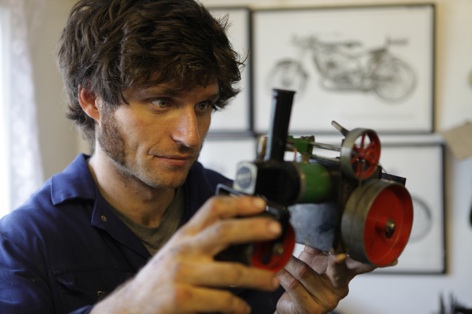It’s often said — by us and our readers — that if the portrayal of engineers and engineering in our culture improved, it would solve some of the problems of the perception of the discipline and of the industries that depend on it. But my colleague Jason Ford’s latest Monday Briefing contained an item on this which has triggered some lively discussion. A TV company has asked for our help to identify an engineer who could front a programme based on inventing, building and then selling devices, vehicles and so on made from parts found in garden sheds, barns and garages.
Several readers have taken exception at the idea that this is a favourable depiction of engineering, with one commenter coining the memorable phrase ‘look at the clever grease monkey TV.’ Which leads me to wonder whether the company have contacted Lincolnshire motorbike racer and Wolverine lookalike Guy Martin, whose day job is truck mechanic and who strikes me as the sort of person who wouldn’t mind at all being described as a grease monkey. No offence, Mr Martin, if you’re reading.

However, it strikes me that we’re actually in a pretty good period for representation of engineering on television — better than we’ve seen for some time. The BBC’s digital channel is running a series on unbuilt infrastructure and civil engineering projects, linking the old designs for projects such as the 19th century Channel tunnel and Joseph Paxton’s glass-covered arcade circling London with modern designs and concepts with interviews with working engineers and architects. Dara O’Briain’s Science Club is occupying a prime midweek slot and proving to be more of a STEM Club, with O’Briain’s background as a physics graduate standing him in good stead and his co-presenters, our old friend Prof Mark Miodownik, physicist and oceanographer Helen Czerski and science writer Alok Jha making illuminating guides through a whole range of engineering-linked technologies. Miodownik’s recent ‘How it works’ series is getting a second airing, giving a working engineer’s guide to the development, properties and use of a whole range of materials. Another BBC series, Genius of Invention, looked at the development of technologies such as power generation and engines with the help of companies like Rolls-Royce, again with Prof Miodownik's involvement. And the Discovery Channel show Extreme Engineering, presented by Danny Forster, who is qualified as an architect, presents the everyday problems and solutions encountered on major engineering projects such as bridges and drilling operations.
So are we just complaining for the sake of complaining, as we Brits so often do? What more do we want? Perhaps a show aimed and scheduled specifically for younger viewers? One idea that’s often floated is a fictional depiction of engineers, presumably because TV has done so much for lawyers and doctors. But that’s probably a non-starter — the reason medicine and law (and crime, for that matter) make such good subjects for dramatic fiction is that they’re really about people and their relationships. If someone could work that into a show based in an engineering practice it might work, but I can easily imagine the carping about how ‘real engineering’ was being sidelined and misrepresented in favour of ‘soapiness’.
Another complaint is that these programmes are fronted by academics and ‘celebrities’ rather than working engineers. Putting aside the fact that working engineers are probably too busy actually working at engineering to start a new job as TV presenter, the people we see are professional communicators of various types. I don’t think any engineer could object to the thought of the enthusiastic and knowledgable Prof Miodownik being associated with the profession (although his choice of floral shirts is sometimes questionable). Perhaps there might be better representation of science and technology on current affairs shows such as 'Question Time' — currently, stand-up comedians and Nigel Farage stand more chance of being invited on than someone who actually knows anything about something practical.
One format that I could imagine succeeding is something based on ‘The Apprentice’ format with contestants faced with a series of different engineering challenges: product design, crisis management role-play, constructing a business case for a manufacturing project, for example. An expert panel (which would probably consist of some of the ‘personalities’ we see at the moment) would act as a judge, with contestants eliminated week by week to end up with an Engineering Champion. It needs some work — what might the prize be? A job with a consultancy? The fulfilment of a cherished personal project? — but it could be an interesting way to showcase the different aspects of engineering and demonstrate how much of it depends on collaboration and discussion.




Nanogenerator consumes CO2 to generate electricity
Whoopee, they've solved how to keep a light on but not a lot else.